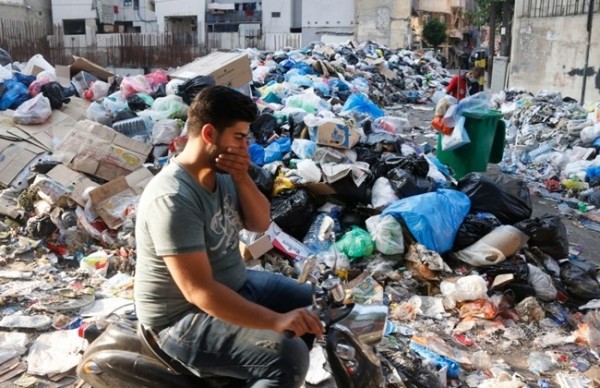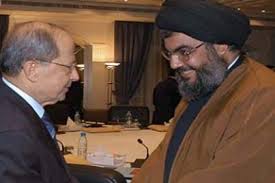 By: Eyad Abu Shakra
By: Eyad Abu Shakra
I remember from my youth the popular Lebanese saying, “Everything in Lebanon is ‘zift’ [asphalt] except the roads!”
Metaphorically, asphalt, or rather, “zift,” came to mean any bleak and slimy bad situation. However, the Lebanese now recall those “zift” days with nostalgia, simply because their current situation is much worse.
In the good old days the Lebanese used to bemoan their “political class” and criticize “political feudalism” and “traditional leaderships”; little did they know what the future held. For example, they never thought they would see the day when one man claimed to be the sole representative of the whole Christian community, the same community whose arena was large enough to accommodate longstanding competition between Émile Eddé, the leader of the National Bloc, and Bechara Al-Khouri, the leader of the Constitutional Bloc—whose groups both transcended sectarian divides. It was also capable not only of living under the high statures of ex-president Fuad Chehab and the Maronite Patriarch Paul Peter Meouchi, but also the popular “triumvirate” of Camille Chamoun, Pierre Gemayel, and Raymond Eddé. Even during the Lebanese civil war, when charismatic Bachir Gemayel sought “to unite the Christian guns,” there were still many Christians occupying prominent positions in the Leftist and Arabist parties of the now defunct National Movement, which refused to tie down the fate of the country’s Christians with to that of its right wing parties.
The scene was similar in the Muslim camp, where the field was also open to multipolar politics. Among the Sunnis not one leader could monopolize Arabism, patriotism, or moderate Islam. As for the Shi’ites, multipolarity was even more clear-cut, whether in northern Beqaa or south Lebanon where no single clan was in control. And, last but not least, the Druze were originally living under the ancient historical Arab bipartisanship of Qays and Yemen, which later reinvented itself under various guises.
Back to today: as Beirut and other Lebanese areas struggle to breathe under mountains of garbage, the problems of the past seem blessings in comparison.
A vacancy
 A couple of days ago, Lebanon’s Environment Minister Mohamed Al-Mashnouq—who is a decent and rational man—asked the public to be patient for a few months and give the government time to find a new and suitable place to dump all the accumulated garbage, and thus solve the niggling problem. The minister, however, seems to have forgotten that a serious crisis threatening the very existence of Lebanon still remains unsolved after more than a year. He forgot, or seems to have forgotten, that the country’s presidency is still vacant because there is one man named Michel Aoun who I believe insists on being the sole and exclusive spokesman of Lebanon’s Christians, and resurrects his old slogan, “freedom, sovereignty, and independence,” in a country that, thanks specifically to him, has in fact ceased to be free, sovereign, and independent!
A couple of days ago, Lebanon’s Environment Minister Mohamed Al-Mashnouq—who is a decent and rational man—asked the public to be patient for a few months and give the government time to find a new and suitable place to dump all the accumulated garbage, and thus solve the niggling problem. The minister, however, seems to have forgotten that a serious crisis threatening the very existence of Lebanon still remains unsolved after more than a year. He forgot, or seems to have forgotten, that the country’s presidency is still vacant because there is one man named Michel Aoun who I believe insists on being the sole and exclusive spokesman of Lebanon’s Christians, and resurrects his old slogan, “freedom, sovereignty, and independence,” in a country that, thanks specifically to him, has in fact ceased to be free, sovereign, and independent!
Aoun claims that he alone is the “guarantor” of Lebanese Christians’ rights, and their secure “shield” in the face of “political ISIS-ism”—as his son-in-law the Lebanese foreign minister informed us. This is indeed strange, since conventional wisdom tells us that in a state created specifically to fulfil the wishes and ensure the security of its Christians, those Christians should seek no refuge but that state itself. Yes, this state—not Iran’s Islamic Revolutionary Guard Corps, which pretends to be infatuated with “the protection of minorities” while in order to further its own interests and influence is engaged in a mad genocidal project against a colossal sea of Sunni Muslims extending from Indonesia in the east to Guyana in the west!
Today, when Michel Aoun, an MP, obstructs the work of the state, while his son-in-law opens up sectarian wounds in an attempt to sell the Christian man on the street fake heroisms achieved by the “savior hero,” he, Aoun, is gambling on the naïveté of those who refuse to see that Hezbollah, the Lebanese branch of Iran’s Revolutionary Guard, is the conductor, motivator, and decision-maker in an illusory and lopsided “pact” whose task is to cover up plans for foreign hegemony in the Middle East.
Furthermore, the Aounists think, first, that Hezbollah is ignorant of Aoun’s political past, and second, that it is ready to hand over real power to their leader. However, the truth is that Hezbollah is quite knowledgeable of who Aoun is, and that Hezbollah’s strategic aim is total hegemony over Lebanon, leading to tying it up with Tehran’s hegemonic “bloc” extending from Iran to the Mediterranean, and including Iraq and Syria.
Solid political results?
It is unfortunate for Lebanon’s Christians that general circumstances in the region seem ostensibly to favor Iran’s plans. Thus, instead of holding Aoun responsible for his actions and dangerous gambles, there are those who whisper that the guy is a “visionary” and even “wise,” and that his bet on a U.S.–Iran alliance against Sunni Islam is well-placed.
Yet, this may not necessarily be true. Actually, it is still too early to expect solid political results from the Iran nuclear agreement, more so while there are still regional players Washington is loath to openly alienate. Another fact worth remembering is that “Political Sunnism” is too large, flexible, and capable of acclimatizing both regionally and globally, to be exemplified by ISIS and its ilk. As such, Washington is deep down quite aware that it would be risking too much if it chose the road of open confrontation in the Middle East; it has been justifying its recent concessions through its desire to settle problems, minimize costly tensions, and keep away from military trouble-spots.
Naturally, in Lebanon Aounists, Assad “Arabists,” and Hezbollah “sectarianists” would all like to forget that while Iran is a theocracy headed by the Vali-e Faqih and controlled by the Revolutionary Guard, the US is a democracy based on the principle of change of government through the ballot box. Hence, tying the existence of Christians—in fact, all minorities—to an agreement between the Vali-e Faqih and a constitutional head-of-state with a limited term in office would be a disastrous adventure indeed.
In any case, some observers are associating the loud noises coming from Aoun and his followers with reports from Tehran claiming that the Iranian leadership is now ready to contemplate three names seriously suggested for the Lebanese presidency; Aoun is not one of them.
This is surely a welcome development. It may solve Lebanon’s problem with one man, facilitate government work, and end the garbage crisis; but on its own, it will certainly not cure those in the country with sick mentalities.
Al Arabiya

Leave a Reply
You must be logged in to post a comment.